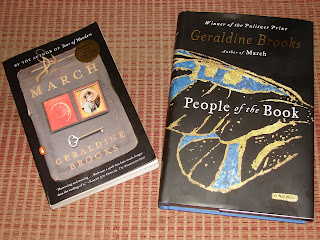
Books written by Geraldine Brooks include "March" and "People of the Book."
At the same time we noted that her previous book “March” also had good reviews along with winning the 2006 Pulitzer Prize. So we decided to order both books.
Brooks is an excellent author and gives through and detailed descriptions of the characters and situations in her books. We read “March” first. It is a follow up story to Louisa May Alcott’s book “Little Women.” In “Little Women” the father is in the army and is stationed in the South somewhere “where the fighting is.” But very little information is given concerning him, his experiences in the war and how the war changed him. “March” attempts to answer these questions.
The story begins with Mr. March, and army chaplain, writing a letter to his wife. He has just survived the battle of Ball’s Bluff, an early Union defeat, and has managed to cross the
An example of this is his association with the actual historical figure John Brown. He not only looses his fortune but is very nearly caught up in the criminal investigation aftermath. The story is told in the first person from March. It is arranged in a series of flashbacks interwoven with present events.
Early in his army experience, March is completely confident that the war is a just war. He is an ardent abolitionist and believes that the use of force is justified in freeing the slaves. But soon the lines between good and evil are not as clear as he once thought.
Many of his fellow soldiers on the Union side are just as racist and condescending to the blacks as any Confederate. March experiences war in its fullness and he is haunted by what he has witnessed, and tormented with guilt over the many people he feels he should have been able to save but did not.
“People of the Book” was a delightful story of the Sarajevo Haggadah. The book is generally arranged similar to “March” with chapters that occur in the past interspersed with chapters of the present.
A haddadah is a book which is used in the Jewish ceremony of Passover. It contains various stories from the Old Testament, such as the stories of creation and Noah’s flood. The Sarajevo Haggadah is unique in that it was created in the mid-fourteenth century in
“People of the Book” tries to fill in the unknown portions of the history of this book, especially focusing on the people that were in some way connected to the production and protection of it.
One caution we would give is that the author in describing relationships between characters uses explicit details. Also the way people were treated in conflicts described in the book are sometimes very graphic.
 Column to share recipes, gardening projects, crafts, home decorating ideas, activities for families to do and more.
Column to share recipes, gardening projects, crafts, home decorating ideas, activities for families to do and more.
No comments:
Post a Comment